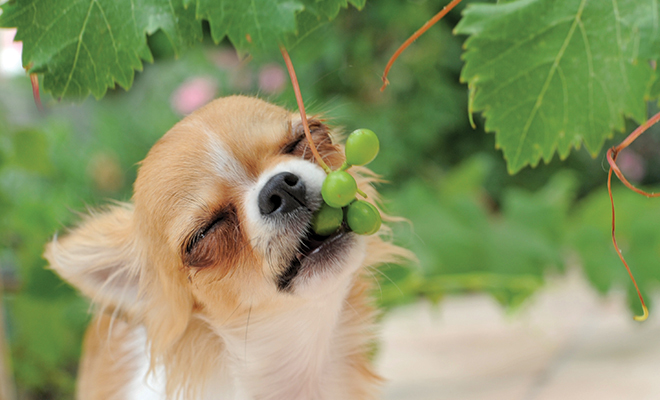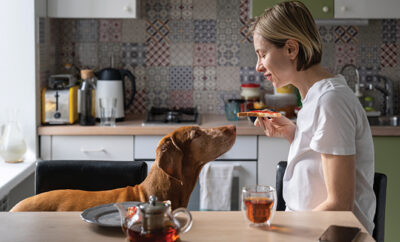
The Six Most Dangerous Foods for Dogs
In small amounts, most people food won’t harm dogs. An occasional bite of a sandwich, a lick or two of ice cream or a tablespoon of leftover stew on top of a bowl of kibble can be a welcome treat and a bonding experience. But there are some foods that are safe for humans but bad (very bad) for your fuzzy best friend. Never feed the following foods to your dog.
Xylitol
This no-calorie sweetener, found in sugar-free gums, candies, some baked goods and even some toothpaste, is dangerous to dogs even in tiny amounts. Ingestion, usually from eating discarded gum or candy, causes a rapid drop in blood sugar levels and will ultimately cause liver failure. The first effects, disorientation and seizures, can begin in as few as 30 minutes after eating. A dog that has consumed anything containing xylitol needs to see a veterinarian as soon as possible for an exam and blood tests.
Grapes and raisins
Veterinary scientists are still trying to find out why grapes and raisins can be fatal even in small doses for some dogs while having no effect on others. The toxicity level is unknown, so it’s best to avoid feeding any grapes or raisins to your pup. Some dogs suffer from repeated vomiting and diarrhea within ten hours after eating and some become lethargic. Contact your vet to avoid the possibility of kidney failure. Even with treatment, adverse effects sometimes last for weeks.
Raw yeast dough
Home bakers should keep uncooked yeast dough away from their dogs. The canine digestive system is the perfect site for letting dough rise and expand. The resulting bloat can cause tissue damage and potentially problems with breathing. In addition, the alcohol produced by the yeast can cause serious levels of alcohol intoxication, which can be fatal. In severe cases, look for a distended stomach, confusion, stupor, vomiting or collapse. Contact a vet at the first signs of a problem.
Chocolate
Because it contains the compounds theobromine and caffeine, chocolate can be dangerous for dogs, depending on the kind and the amount eaten. The rule of thumb is, the darker the chocolate, the greater the danger, with baking chocolate and cocoa powder being the most toxic. Dogs that have eaten chocolate can develop tachycardia (very fast heart rate), abdominal distress, restlessness, tremors and death. Pet poison control hotlines can calculate possible problems based on a dog’s weight and the type of chocolate eaten. Contact them and your vet as soon as possible.
Onions and garlic
Very small amounts of onions and garlic are usually harmless for most dogs. Garlic is even used as a flavoring in some dog treats (dogs love it) and commercially made dog food should cause no problems. But larger amounts can cause digestive system inflammation and hemolytic anemia (damage to red blood cells). An ounce or two of garlic or five to ten ounces of onion can cause sickness in a 20-lb. dog. Onion and garlic powder and onion soup mixes are even more hazardous because they are concentrated. Signs of trouble can be weakness, lethargy and pale gums. In severe cases, the lack of oxygen-carrying blood can cause fainting. Some breeds–Shiba Inus and Akitas in particular–are particularly sensitive. If treated promptly, prognosis for recovery is very good.
Raw meat, poultry, fish and eggs
Despite the popularity of raw food diets for dogs, raw meat, poultry, fish and eggs can contain harmful bacteria that can cause food poisoning. Raw bones can lodge in a dog’s throat and cooked bones can splinter and, if swallowed, can cause intestinal damage.
Instead, feed your dog fruit and vegetables as treats. Cherries, bananas, peaches, melons, apples, oranges and other fruits make great treats. Seeds of these fruits can contain cyanide, but smaller seeds (like apples and cherries) will pass through a dog’s dietary tract intact and won’t cause ill effects. Larger fruits cut into small pieces with the pit removed can be a healthy dog treat.
Most dogs love vegetables. Steamed or boiled carrots, green beans, kale stems, ripe tomatoes, asparagus, cauliflower, store-bought mushrooms and even avocado (bad for birds, rabbits and horses) make tasty, healthy dog treats. Avoid giving dogs deep-fried foods or raw potatoes. Both can cause stomach upset.
Never feed your dog anything containing alcohol or caffeine and never give any human medicine without your vet’s permission. Keep your dog out of the garbage since rotten and moldy foods can make dogs sick. Some dogs are allergic to certain foods; the allergy usually manifests as skin and stomach problems. If you suspect a food allergy, consult your veterinarian. And don’t overfeed your dog. Keeping your canine friend trim will add years to its life.
In a crisis, you can call any pet poison control center where, for a small fee, you can talk with a vet who will answer your emergency questions. The ASPCA number is 888-426-4435.
Sources: pets.webmd.com, petinsurance.com and vpivetchannel.com.







